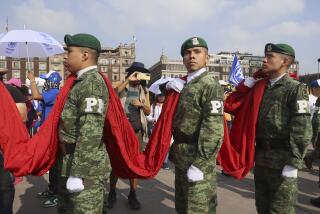Philippine opposition takes early lead
- Share via
MANILA — Opponents of President Gloria Macapagal Arroyo have taken an early lead in races for the Philippine Senate, according to preliminary midterm election results.
Monday’s election was marred by political killings, allegations of vote buying, missing ballot boxes and other incidents. Bomb threats and other problems forced election officials to postpone voting in 14 towns, with more than 100,000 eligible voters, in the mainly Muslim south.
As ballot counting continued this morning, eight members of the Genuine Opposition alliance were leading in races for 12 Senate seats and two independents were among the other front-runners. Only two of Arroyo’s backers in the Team Unity alliance were among the top 12.
Team Unity leaders said they expected to do better in the Senate races as more returns came in.
When polls closed Monday afternoon, Arroyo said the country was at a “crossroads while waiting for the announcement of the winners,” and called for unity. Arroyo, who was elected to a six-year term in 2004, hopes her supporters will win enough seats to defeat moves to impeach her.
“There is intense fighting in all campaigns but we will be generous in victory or defeat,” said the president, who has survived two impeachment efforts and several coup attempts. “For the sake of the country, we should close this chapter of division and fighting after the people have spoken and let us open the door to unity and cooperation.”
Allegations of vote buying were widespread, with numerous candidates accused of giving bags of rice, cash payments from about $1 to $30, or other gifts in exchange for votes. In Manila, national Police Chief Oscar Calderon said, “We will make sure that charges are filed.”
In one incident, two men were arrested after they were allegedly caught on a TV camera accepting bribes to vote for a congressional candidate.
In other cases, police arrested men handing out cash and campaign materials for several candidates.
A total of 46,133 candidates are contesting 17,889 posts, including local council seats and the offices of mayors and governors. Voters are also electing members of the 274-seat House of Representatives. Half of the Senate’s 24 seats are up for grabs.
In the final days of the campaign, some polls suggested that Arroyo’s opponents could gain ground in the Senate, whose members are elected to six-year terms.
But the president’s Team Unity alliance was expected to do well in races for the House of Representatives, where terms run for three years.
Local news reports said at least 116 people had died in election-related violence, and national police put the death toll at 115 in 191 incidents of bloodshed during the campaign and on voting day. Among the dead were 60 politicians, police said.
Violence is common in Philippine elections, but the national police called Monday’s midterm vote “generally peaceful, with some untoward incidents.”
During the last elections in 2004, they said, 189 people were killed.
Fewer than 20% of eligible voters living overseas, many of them in the U.S., cast absentee ballots, according to the national election commission.
The final turnout from abroad could reach 80,000 of 504,110 registered voters, or almost 16%, said commissioner Florentino Tuason, who is in charge of overseas absentee voting.
In the 2004 elections, when Arroyo won, 65% of overseas voters cast ballots.
More to Read
Sign up for Essential California
The most important California stories and recommendations in your inbox every morning.
You may occasionally receive promotional content from the Los Angeles Times.










